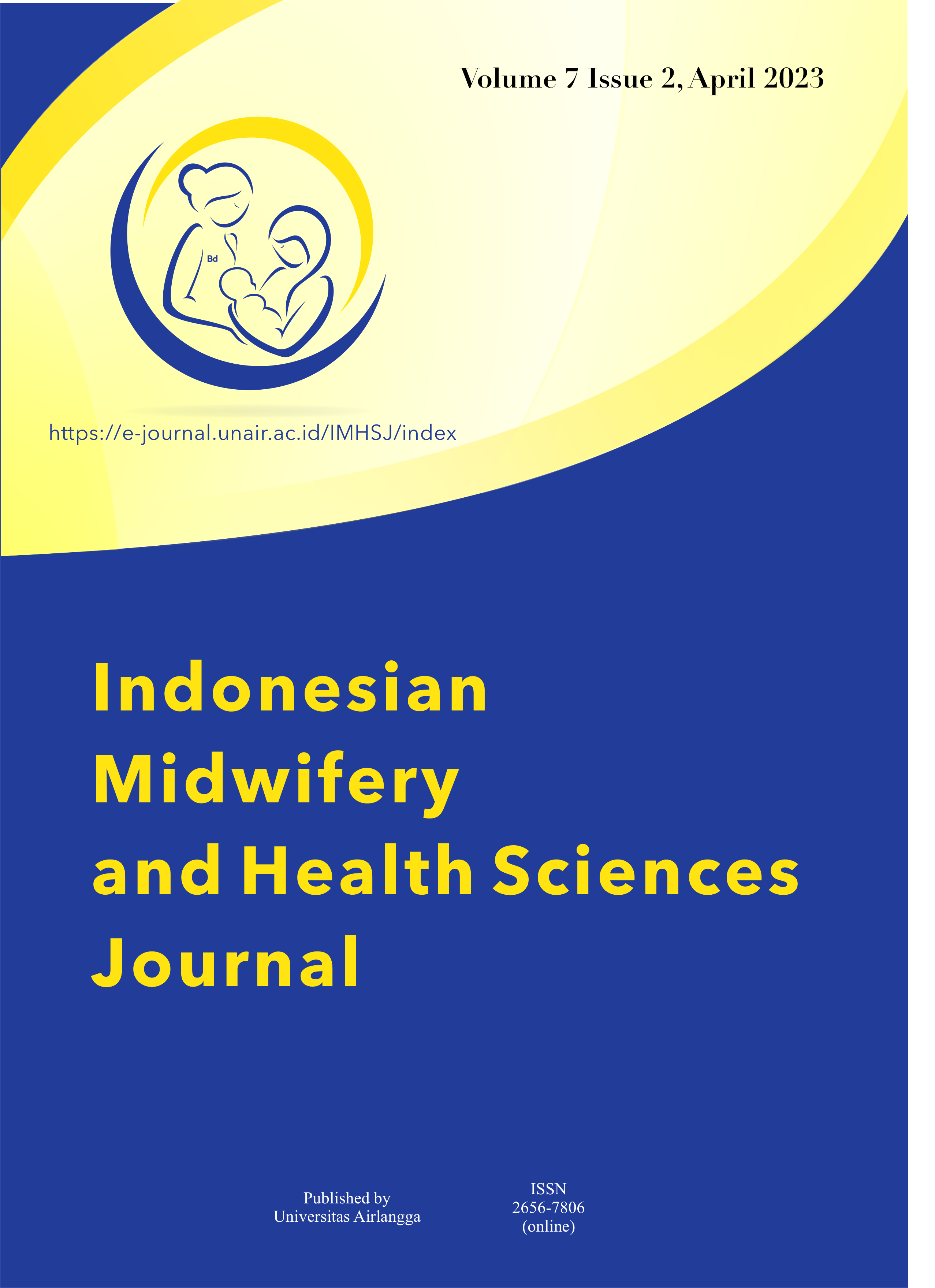THE BEHAVIOR OF FULFILLING THE BASIC NEEDS OF EARLY CHILDHOOD DURING COVID-19 PANDEMIC

Downloads
Background: In conditions of uncertainty and anxiety about pandemic conditions, children still have the right to have the opportunity to grow and develop optimally, both cognitively, mentally, and socially. Parents, as the primary caregivers of children at home and who hold the main responsibility for the growth and development of early childhood children, should meet the basic needs of children's growth and development. The basic needs of children's growth and development consist of 3 main aspects: Fostering, Asih, and Asah. Purpose: This study aims to analyze parenting behavior to fulfill early childhood growth and development needs during the Covid-19 pandemic. Methods: This research was conducted at Al Amien Jember Kindergarten from August to November 2020. The population in this study is all 282 parents of Al Amien Jember Kindergarten students. The sample size calculation uses the formula from Snedecor and Cochran with a sample size of 72 parents. Result: The results showed that most parents with good knowledge (80,56%) and good attitudes (80,56%) had good basic needs fulfillment behavior. The results of statistical analysis using the Spearman correlation test show a significant relationship between parental knowledge (p-value = 0.003) and parental attitudes (p-value = 0.000) with the behavior of fulfilling the basic needs of early childhood. Conclusion: Knowledge and attitudes of parents related to the parental behavior in meeting the basic needs of early childhood development. This study contributes to parenting during the COVID-19 pandemic so that children's growth and development remain optimal.
Araujo, L. A. de, Veloso, C. F., Souza, M. de C., Azevedo, J. M. C. de, & Tarro, G. (2021). The potential impact of the COVID-19 pandemic on child growth and development : a systematic review. Journal de Pediatria, 97(4), 369–377.
Black, S. R., Evans, M. L., Aaron, L., Brabham, D. R., & Kaplan, R. M. (2021). Covariance between Parent and Child Symptoms before and during the COVID-19 Pandemic. Journal of Pediatric Psychology, 46(10), 1182–1194. https://doi.org/10.1093/jpepsy/jsab086
Cluver, Licie, Lachman, J. M., Sherr, L., Wessels, I., Krug, E., Rakotomalala, S., Bight, S., Hillis, S., Bachman, G., Green, O., Butchart, A., Tomlinson, M., Ward, C. L., Doubt, J., & McDonald, K. (2020). Parenting in a time of COVID-19. The Lancet, 395(April).
Cluver, Lucie, Lachman, J. M., Sherr, L., Wessels, I., Krug, E., Rakotomalala, S., Blight, S., Hillis, S., Bachman, G., Green, O., Butchart, A., Tomlinson, M., Ward, C. L., Doubt, J., & McDonald, K. (2020). Parenting in a time of COVID-19. The Lancet, 395(11), e64.
Coyne, L. W., Gould, E. R., Grimaldi, M., Wilson, K. G., Baffuto, G., & Biglan, A. (2020). First Things First : Parent Psychological Flexibility and Self-Compassion During COVID-19. Behavior Analysis in Practice.
Cusinato, M., Iannattone, S., Spoto, A., Poli, M., Moretti, C., Gatta, M., & Miscioscia, M. (2020). Stress, resilience, and well-being in Italian children and their parents during the COVID-19 pandemic. International Journal of Environmental Research and Public Health, 17(22), 1–17. https://doi.org/10.3390/ijerph17228297
Editor, F., Kempe, C. H., Helfer, P. E. R., Krugman, R., Leventhal, J., Wolfe, D., Bross, D., Melton, G., Afifi, T. O., Brown, S. J., Bellis, M. De, Carolina, N., Dube, S., Emery, C., Fraser, J., Jud, A., Lindberg, D., Melville, J., Wang, M., ... Parton, N. (2021). Inside Front Cover - Editorial Board. Child Abuse & Neglect, 117, 105144. https://doi.org/10.1016/s0145-2134(21)00217-9
Jansen, E., G.Thapaliya, A.Aghababian, J.Sadler, Smith, K., & Carnell, S. (2021). Parental stress, food parenting practices and child snack intake during the COVID-19 pandemic. Appetite, 06(161), 1–24. https://doi.org/10.1016/j.appet.2021.105119.Parental
Karki, U., Dhonju, G., & Kunwar, A. R. (2020). Parenting during the COVID-19 pandemic. Journal of the Nepal Medical Association, 58(231), 957–959. https://doi.org/10.31729/jnma.5319
Lopez-Bueno, R., F.Lopez-Sanchez, G., Casajus, J. A., Calatayud, J., A.Tully, M., & Smith, L. (2021). Potential health-related behaviors for pre-school and school-aged children during COVID-19 lockdown: A narrative review. Preventive Medicine, 143(January), 106349.
Lucassen, N., de Haan, A. D., Helmerhorst, K. O. W., & Keizer, R. (2021). Interrelated Changes in Parental Stress, Parenting, and Coparenting Across the Onset of the COVID-19 Pandemic. Journal of Family Psychology, 35(8), 1065–1076. https://doi.org/10.1037/fam0000908
Majumdar, P. (2021). Impact of second wave covid-19 on children in India. Child Abuse and Neglect, 117(May), 105116. https://doi.org/10.1016/j.chiabu.2021.105116
Motataianu, I. R. (2015). Parent-child Connection – Emotional Synchronization and Playing; a Possible Model to Combat the Child's Unsafe Attachment. Procedia - Social and Behavioral Sciences, 180(November 2014), 1178–1183. https://doi.org/10.1016/j.sbspro.2015.02.238
Neubauer, A. B., Schmidt, A., Kramer, A. C., & Schmiedek, F. (2021). A Little Autonomy Support Goes a Long Way: Daily Autonomy-Supportive Parenting, Child Well-Being, Parental Need Fulfillment, and Change in Child, Family, and Parent Adjustment Across the Adaptation to the COVID-19 Pandemic. Child Development, 92(5), 1679–1697. https://doi.org/10.1111/cdev.13515
Nicoletti, C., & Tonei, V. (2020). Do parental time investments react to changes in child ' s skills and health ? European Economic Review, 127. https://doi.org/10.1016/j.euroecorev.2020.103491
Psikologi, J. (2013). Keberadaan Orang Tua Bersama Anak. 9.
Roos, L. E., Salisbury, M., Penner-Goeke, L., Cameron, E. E., Protudjer, J. L. P., Giuliano, R., Afifi, T. O., & Reynolds, K. (2021). Supporting families to protect child health: Parenting quality and household needs during the COVID-19 pandemic. PLoS ONE, 16(5 May), 1–19. https://doi.org/10.1371/journal.pone.0251720
Russell, B. S., Hutchison, M., Tambling, R., Tomkunas, A. J., & Horton, A. L. (2020). Initial Challenges of Caregiving During COVID-19: Caregiver Burden, Mental Health, and the Parent–Child Relationship. Child Psychiatry and Human Development, 51(5), 671–682. https://doi.org/10.1007/s10578-020-01037-x
Shabas, S. (2016). Relationships Between Parents and Preschool-Age Children Attending Kindergartens. Procedia - Social and Behavioral Sciences, 233(May), 269–273. https://doi.org/10.1016/j.sbspro.2016.10.124
Tang, S., Xiang, M., Cheung, T., & Xiang, Y. (2021). Mental health and its correlates among children and adolescents during COVID-19 school closure : The importance of parent-child discussion. Journal of Affective Disorders, 279(January), 353–360.
Taubman – Ben-Ari, O., Ben-Yaakov, O., & Chasson, M. (2021). Parenting stress among new parents before and during the COVID-19 pandemic. Child Abuse and Neglect, 117(October 2020), 105080. https://doi.org/10.1016/j.chiabu.2021.105080
Wang, M., Ed, D., Henry, D. A., Ph, D., Toro, J. Del, Ph, D., Scanlon, C. L., Ph, D., Schall, J. D., & S, M. (2021). COVID-19 Employment Status , Dyadic Family Relationships , and Child Psychological Well-Being. Journal of Adolescent Health, 69(January), 705–712.
Copyright (c) 2023 Devi Arine Kusumawardani, S.Keb., M.Kes., Elok Permatasari

This work is licensed under a Creative Commons Attribution-ShareAlike 4.0 International License.
1. The journal allows the author to hold the copyright of the article without restrictions.
2. The journal allows the author(s) to retain publishing rights without restrictions
3. The formal legal aspect of journal publication accessibility refers to Creative Commons Atribution-Share Alike 4.0 (CC BY-SA).
This Journal (e-ISSN 2656-7806) is licensed under a Creative Commons Attribution-ShareAlike 4.0 International License.
















